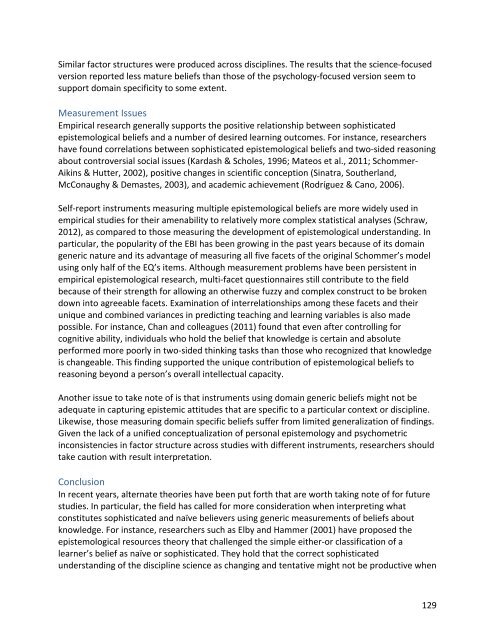A COMPENDIUM OF SCALES for use in the SCHOLARSHIP OF TEACHING AND LEARNING
compscalesstl
compscalesstl
You also want an ePaper? Increase the reach of your titles
YUMPU automatically turns print PDFs into web optimized ePapers that Google loves.
Similar factor structures were produced across discipl<strong>in</strong>es. The results that <strong>the</strong> science-foc<strong>use</strong>d<br />
version reported less mature beliefs than those of <strong>the</strong> psychology-foc<strong>use</strong>d version seem to<br />
support doma<strong>in</strong> specificity to some extent.<br />
Measurement Issues<br />
Empirical research generally supports <strong>the</strong> positive relationship between sophisticated<br />
epistemological beliefs and a number of desired learn<strong>in</strong>g outcomes. For <strong>in</strong>stance, researchers<br />
have found correlations between sophisticated epistemological beliefs and two-sided reason<strong>in</strong>g<br />
about controversial social issues (Kardash & Scholes, 1996; Mateos et al., 2011; Schommer-<br />
Aik<strong>in</strong>s & Hutter, 2002), positive changes <strong>in</strong> scientific conception (S<strong>in</strong>atra, Sou<strong>the</strong>rland,<br />
McConaughy & Demastes, 2003), and academic achievement (Rodríguez & Cano, 2006).<br />
Self-report <strong>in</strong>struments measur<strong>in</strong>g multiple epistemological beliefs are more widely <strong>use</strong>d <strong>in</strong><br />
empirical studies <strong>for</strong> <strong>the</strong>ir amenability to relatively more complex statistical analyses (Schraw,<br />
2012), as compared to those measur<strong>in</strong>g <strong>the</strong> development of epistemological understand<strong>in</strong>g. In<br />
particular, <strong>the</strong> popularity of <strong>the</strong> EBI has been grow<strong>in</strong>g <strong>in</strong> <strong>the</strong> past years beca<strong>use</strong> of its doma<strong>in</strong><br />
generic nature and its advantage of measur<strong>in</strong>g all five facets of <strong>the</strong> orig<strong>in</strong>al Schommer’s model<br />
us<strong>in</strong>g only half of <strong>the</strong> EQ’s items. Although measurement problems have been persistent <strong>in</strong><br />
empirical epistemological research, multi-facet questionnaires still contribute to <strong>the</strong> field<br />
beca<strong>use</strong> of <strong>the</strong>ir strength <strong>for</strong> allow<strong>in</strong>g an o<strong>the</strong>rwise fuzzy and complex construct to be broken<br />
down <strong>in</strong>to agreeable facets. Exam<strong>in</strong>ation of <strong>in</strong>terrelationships among <strong>the</strong>se facets and <strong>the</strong>ir<br />
unique and comb<strong>in</strong>ed variances <strong>in</strong> predict<strong>in</strong>g teach<strong>in</strong>g and learn<strong>in</strong>g variables is also made<br />
possible. For <strong>in</strong>stance, Chan and colleagues (2011) found that even after controll<strong>in</strong>g <strong>for</strong><br />
cognitive ability, <strong>in</strong>dividuals who hold <strong>the</strong> belief that knowledge is certa<strong>in</strong> and absolute<br />
per<strong>for</strong>med more poorly <strong>in</strong> two-sided th<strong>in</strong>k<strong>in</strong>g tasks than those who recognized that knowledge<br />
is changeable. This f<strong>in</strong>d<strong>in</strong>g supported <strong>the</strong> unique contribution of epistemological beliefs to<br />
reason<strong>in</strong>g beyond a person’s overall <strong>in</strong>tellectual capacity.<br />
Ano<strong>the</strong>r issue to take note of is that <strong>in</strong>struments us<strong>in</strong>g doma<strong>in</strong> generic beliefs might not be<br />
adequate <strong>in</strong> captur<strong>in</strong>g epistemic attitudes that are specific to a particular context or discipl<strong>in</strong>e.<br />
Likewise, those measur<strong>in</strong>g doma<strong>in</strong> specific beliefs suffer from limited generalization of f<strong>in</strong>d<strong>in</strong>gs.<br />
Given <strong>the</strong> lack of a unified conceptualization of personal epistemology and psychometric<br />
<strong>in</strong>consistencies <strong>in</strong> factor structure across studies with different <strong>in</strong>struments, researchers should<br />
take caution with result <strong>in</strong>terpretation.<br />
Conclusion<br />
In recent years, alternate <strong>the</strong>ories have been put <strong>for</strong>th that are worth tak<strong>in</strong>g note of <strong>for</strong> future<br />
studies. In particular, <strong>the</strong> field has called <strong>for</strong> more consideration when <strong>in</strong>terpret<strong>in</strong>g what<br />
constitutes sophisticated and naïve believers us<strong>in</strong>g generic measurements of beliefs about<br />
knowledge. For <strong>in</strong>stance, researchers such as Elby and Hammer (2001) have proposed <strong>the</strong><br />
epistemological resources <strong>the</strong>ory that challenged <strong>the</strong> simple ei<strong>the</strong>r-or classification of a<br />
learner’s belief as naïve or sophisticated. They hold that <strong>the</strong> correct sophisticated<br />
understand<strong>in</strong>g of <strong>the</strong> discipl<strong>in</strong>e science as chang<strong>in</strong>g and tentative might not be productive when<br />
129


